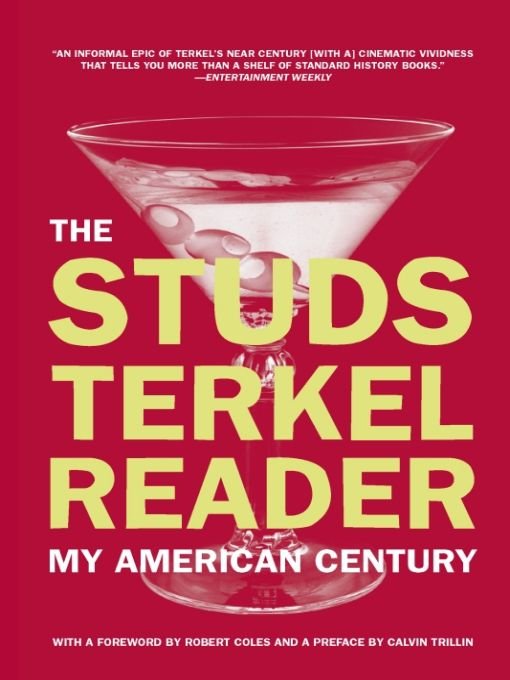Table of Contents
r The Studs Terkel Reader collects the best interviews from eight of Terkels classic oral histories together with his wonderful original introductions to each book. Featuring selections from American Dreams, Coming of Age, Division Street, The Good War, The Great Divide, Hard Times, Race, and Working, this greatest hits volume is a treasury of Terkels most memorable subjects that will delight his many lifelong fans and provide a perfect introduction for those who have not yet experienced the joy of reading Studs Terkel.
Winner of the Pulitzer Prize and a member of the Academy of Arts and Sciences, Studs Terkel is the author of twelve books of oral history (most of which are available from The New Press). He is a recipient of a Presidential National Humanities Medal, the National Book Foundation Medal for Distinguished Contribution to American Letters, a George Polk Career Award, and the National Book Critics Circle Ivan Sandrof Lifetime Achievement Award.
OTHER BOOKS BY STUDS TERKEL
American Dreams
Lost and Found
And They All Sang
Adventures of an Eclectic Disc Jockey
Coming of Age
Growing Up in the Twentieth Century
Division Street
America
Giants of Jazz
The Good War
An Oral History of World War II
Hard Times
An Oral History of the Great Depression
Hope Dies Last
Keeping the Faith in Troubled Times
My American Century
Race
How Blacks and Whites Think and Feel
About the American Obsession
The Spectator
Talk About Movies and Plays
with the People Who Make Them
Talking to Myself
A Memoir of My Times
Will the Circle Be Unbroken?
Reflections on Death, Rebirth, and Hunger for a Faith
Working
People Talk About What They Do All Day and
How They Feel About What They Do
to
ANDRE SCHIFFRIN
editor and publisher
In memory, we find the most complete release from the narrowness of presented time and place.... The picture is one of human beings confronted by a world in which they can be masters only as they discover ways of escape from the complete sway of immediate circumstances.
F.C. BARTLETT, Remembering
PREFACE
Studs Terkels accomplishments as Americas preeminent listener are all the more remarkable when you consider the fact that he happens to be a prodigious talker. He is, in other words, a monument to restraint. A couple of times, Ive reversed roles with StudsIve interviewed him for an hour on stageand each time I was tempted to ask him one question, take off my lapel-microphone, and join the audience. He could have easily held the audience for a one-hour answer that ranged from his thoughts on jazz to his soap-opera career playing gangsters to the dinner-table conversations at the mens hotel his mother ran to his antic experiences with the blacklist to the happy times in his favorite Chicago saloon, Ricardos, where one of the waiters was cued to stroll over to the table and join him in the Spanish Civil War song Los Cuatros Generales. Once Studs got on his roll, in fact, he might not have even noticed that I was missing.
One of those stage interviews was in San Francisco and one in New York, but wherever Studs is he brings Chicago with him. In the early days of cable televisionwhen there were no cable listings in the newspapers and the most talked about show on local cable in New York consisted of a man who walked around town asking women to show him their breasts and Chicago was not yet even wired for cableStuds and I did a talk show called Nightcap for a channel that I think was a precursor of Arts & Entertainment. We sometimes referred to Nightcap as the only fully clothed show on cable T.V. In each program, we chatted with a panel of people who were distinguished in a particular art formthree divas, say, or three architects or three writers of science fictionand what continued to amaze me was that Studs seemed to know nearly all of them. I concluded that illustrious visitors to Chicago were taken to see Studs in the way that illustrious visitors to Chicago were once given a tour of the stockyards. Once, somebody on the show mentioned Jane Austen, and I said, If she ever went through Chicago, Studs knows her.
In the years Studs did his interview show on the radio, authors, even some who were not particularly illustrious, were taken to see him when they got to Chicago on a book tour. If an author arrived toward the end of his tour, he was likely to have repeated phrases from his book so often that they were beginning to have a depressing similarity to the flight attendants announcement about seat backs and tray tables. Then Studs would open up a copy of the book, which had been heavily underlined with a broad black pen, and read a few passages in that gravelly voice that somehow made the words sound fresh again. The author would find himself thinking, Hey, that writings not half bad! I once suggested that foundations that wanted to buck up American writers didnt have to send them to villas in Italy. They could simply have the writers interviewed by Studs. You wouldnt even have to air the results.
When I was the visiting author, Studs and I usually got into a taxi after the taping to go to lunch, and the driver almost invariably realized that he had one of Chicagos iconic figures in the back seat. There usually followed a conversation in which Studs, through his questions, displayed a remarkable familiarity with the drivers old neighborhood, whether the neighborhood was Back of the Yards or Nigeria. The almost instantaneous connection Studs made with the driver was always a reminder to me that this man, who had interviewed Leonard Bernstein and Bertrand Russell and Ralph Ellison and Zero Mostel and Margaret Meade, created his most enduring work by gathering the thoughts of ordinary people on their struggles and their daily labor and even their deaths. They shared those thoughts with him, I think, partly because they sensed that his curiosity and his generosity of spirit embraced everyone, without regard to rank or station. They recognized him as a monument to much more than simply restraint.
CALVIN TRILLIN
[The following appeared in the original edition of this book, which was first published in 1997 under the title My American Century.]
FOREWORD
The title of this book tells of a happy convergencea writing observers destiny to have lived in a nation whose recent fate has granted it a worldwide ascendancy. Studs Terkel was born during the early adolescence of this century, the second decade, when we emerged as a great power, the nation whose belated entrance into the First World War decisively hastened its conclusion. Thereafter, gradually (and reluctantly and even fearfully), America became first among nations, its economic and military potential a looming presence even in the 1930s, when (like other capitalist countries) it lay perilously wounded. But the Great Depression, here and abroad, ended with the Second World Warindeed, Hitler had shown the world in the middle 1930s what military preparedness can do for a stagnant, even prostrate economy: a huge shot in the arm. By the early 1940s, to quote President Roosevelt, the United States had become a great arsenal of democracymillions of men and women, hitherto jobless or only marginally employed, now working full-time (often overtime) at a halfway decent wage.




